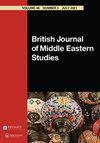巴解组织的政治传播舞台;阿拉法特与争取媒体合法性的斗争
IF 0.6
4区 社会学
Q2 AREA STUDIES
引用次数: 0
摘要
ABSTRACT 巴勒斯坦解放组织已从不同学科和角度进行了广泛的研究。然而,人们很少关注其媒体和/或政治传播战略,而这些战略与 1969 年至 1982 年期间的政治演变和目标是相辅相成的,这一时期的特点是充满变化和政治不确定性,以及巴解组织密集的建国进程。政治传播不仅是一种基本的政治实践和策略,也是政治精英为获得媒体合法性、确保其目标和意识形态得到支持而展开竞争的舞台,本文试图通过探讨政治传播来部分填补这一空白。通过对巴解组织大众传媒平台在审查期间的档案研究、原始资料以及对巴解组织前媒体人员的访谈,本文首先概述了巴解组织对大众传媒机构和其他文化类型的投资,然后讨论了其在 1969 年至 1982 年期间的政治传播战略及其目标。然后,本文论述了已故巴解组织主席亚西尔-阿拉法特如何在政治传播领域积极竞争,以获得媒体合法性,并确保公众对巴解组织意识形态和目标的认同。在此过程中,本文并没有暗示阿拉法特实现了对政治传播空间的完全控制,也没有暗示其他游击队领导人、阿拉伯人和其他行为者没有在这一领域展开竞争。相反,这种研究方法强调的是政治机构与结构之间在波动和变化时期的关系,从而补充了政治传播研究中侧重于框架和话语的主流方法。本文章由计算机程序翻译,如有差异,请以英文原文为准。
The PLO’s political communication arena; Arafat and the struggle for media legitimacy
ABSTRACT The Palestine Liberation Organization has been extensively studied and researched in a variety of disciplines and perspectives. However, little attention has been paid to its media and/or political communication strategies that went hand in hand with its political evolution and aims from 1969 to 1982, a period marked by flux and political uncertainty as well intensive PLO state-building processes. This paper seeks to partially fill the gap by addressing political communication not only as a fundamental political practice and strategy but also as an arena in which political elites compete to achieve media legitimacy and ensure support for their objectives and ideologies. Drawing on archival research of the PLO mass media platforms during the period under review, primary sources and interviews with former PLO media personnel, the paper begins with an overview of the PLO’s investment in mass media institutions and other cultural genres before discussing its political communication strategy and its aims in the period from 1969 to 1982. The paper then addresses how the late PLO chairman Yasser Arafat actively competed in the political communication arena to achieve media legitimacy and secure public consent for the PLO’s ideologies and aims. In doing so, the paper does not suggest Arafat achieved total domination of the political communication space nor that other guerrilla leaders, Arab and other actors did not compete in this arena. Rather, the approach emphasizes the relationship between political agency and structure during moments of flux and change, thus complementing dominant approaches in political communication research that focus on framing and discourse.
求助全文
通过发布文献求助,成功后即可免费获取论文全文。
去求助
来源期刊
CiteScore
2.00
自引率
11.10%
发文量
75
期刊介绍:
The British Journal of Middle Eastern Studies is a refereed academic journal published for the British Society for Middle Eastern Studies (popularly known as BRISMES). Founded in 1974 as the BRISMES Bulletin, the British Journal of Middle Eastern Studies assumed its present title in 1991 reflecting its growth into a fully-fledged scholarly journal. The editors aim to maintain a balance in the journal"s coverage between the modern social sciences and the more traditional disciplines associated with Middle Eastern and Islamic Studies. They welcome scholarly contributions on all aspects of the Middle East from the end of classical antiquity and the rise of Islam.

 求助内容:
求助内容: 应助结果提醒方式:
应助结果提醒方式:


